Chateau Montgeoffroy in the Loire Valley. The central building was built in the 18th century in between the 16th century wings with rounded turrets. The moat and chapel are also from the 16th century.
Of all the 300 magnificent chateaus in the famous Loire Region in France, Chateau de Montgeoffroy, one of the last to be built, is considered one of the finest. The region surrounding the Loire, France’s longest river, is known as the Valley of the Kings, or the Royal River, because so many French royals and noblemen built houses among the vineyards and gently rolling lands that make up the fertile landscape. Many of these chateaux were built on older sites dating from medieval times and even further back, on the fortress ruins of Neolithic sites. Most were built using the white limestone (Pierre de Loire) found in the region, giving a certain unified appearance to the graceful and elegant chateaux. Today, many of the chateaux are private homes, while some are museums and some are active vineyards. What sets Montgeoffroy apart from other Loire chateaux is simple – it has remained the same as it was when it was built. A time capsule of sorts, it provides a glimpse into everyday life among the privileged few right before the outbreak of the Revolution. Montgeoffroy was one of the few chateaux to escape destruction during those violent times of Marie Antoinette. Nothing of Chateau Montgeoffroy has changed through the centuries - all the furniture and household goods that were listed on inventories taken before the Revolution remain in the house today. The catalogued archives are proof of this. Every piece of furniture, painting and accessory remains in the house as it did when the chateaux was first designed. Even the kitchen retains its original 260 copper pots, which look remarkably in vogue today. Even more amazing, the same family still owns the chateau. Thus, a visit to Montgeoffroy is witness to the most beautiful period in design – the 18th century. Time truly stands still at Montgeoffroy.
The chateau, located in Maze, as it is today, was built in the 18th century between 1772 and 1775, but its history dates back several centuries before that. The two distinctive round towers of the chateau, the moat and the chapel actually date back to 1543. The main large, central portion was designed by Nicolas Barre for Erasme de Contades who was the commander of the German army during the Sevens Years War. The Marquis had several mistresses which he kept in secret rooms he had built in the chateau. One apartment even had a spiral staircase that led to the mistress’s handmaiden’s room. All this of course, is what life was like in the 18th century for the privileged class. Chateau de Montgeoffroy is considered a masterpiece of the 18th century French architecture. For lucky Francophiles, the family opens part of the chateau to visitors each summer.
This month, the French magazine Art and Decoration, published several gorgeous photographs of Montgeoffroy. Taking photographs of the interiors during tours must not be allowed, as none show up in Flickr or Picasa. Additionally, there are very few published photographs of the chateau, so these pictures from Art and Decoration are all the more valuable. It is amazing to look at these interiors which haven’t changed for centuries and see how current certain parts look. Luckily the few old photographs of the chateau exist to compare then and now. As it is often said, the best way to keep an interior from quickly dating is to use French antiques. Montgeoffroy certainly proves that theory.
Enjoy!!!!

An aerial view of Montgeoffroy showing the long gravel drive and stables off the left. Notice the two guard houses at the corners of the front property.
Portrait of Erasme de Contades,dressed for battle, who commissioned Montgeoffroy. This painting hangs in the Grand Salon today.
The gates that stand at the end of the long drive.
A rare early postcard of the chateau.
As it looks today, here you can see the wonderful shutters and Versailles planters. Notice how the center front doors and the end doors are arched. And notice too, the dormers, the Oeil de boeuf windows that are often removed from buildings and sold in antique stores. The creamy limestone blocks are so gorgeous!!!
 From Art and Decoration, the butler’s pantry, overlooking the front courtyard, with its marble floor and sink. What a sink!!! The enfilade on the right is like those seen in fine antique stores. Remember, everything is like it was during the 18th century!
From Art and Decoration, the butler’s pantry, overlooking the front courtyard, with its marble floor and sink. What a sink!!! The enfilade on the right is like those seen in fine antique stores. Remember, everything is like it was during the 18th century!
From Art and Decoration – the Grand Salon with its Versailles parquet floor. The article is written in French, so it was hard to follow, but apparently, the family has recently refreshed the upholstery – many of which originally came from Braquenie, now owned by Pierre Frey. I adore these Louis XV chairs with their painted finishes. Notice the console between the windows – painted gray, like the boiserie, so trendy! The lantern is to die for.
A close up of the beautiful chairs, with their graceful, curving lines. The bottom cushions are plump, filled with down. The fabric is attached to the frame with today’s hot nail heads.
I love this painted console – I have seen these in so many antique stores, just not quite as ornate or pretty!! Notice the carved urn on the stretcher – divine!
A close up of the French door, showing its age. Notice how you can see the limestone facade, then the exterior shutter, along with an interior shutter. The hardware shows centuries of use.
A rare photograph of the Grand Salon from years gone by. Notice how nothing much has changed. The painted console remains between the two French doors. The same lantern is hanging. This view of the salon is of the other side than shown in the magazine Art and Decoration.
In an older photograph from a book, here you can see how the room is shown with two different sets of chairs. Notice the clocks or barometers flanking the doorway! Beautiful. The lantern remains, as does the backgammon table. The fabric looks changed here from above and from today.
In another set of early pictures, the yellow chairs appear in a striped fabric. The same small end tables are seen here. Here is the portrait of the original owner. The sconces remain, but the mantelscape is a bit different.
The Grand Salon: The other side of the room with the backgammon table. This looks remarkably like the earlier postcard shown earlier.
Art and Decoration: the dining room with its raspberry colored table cloth. Another beautiful lantern. Notice the urn in relief above the door. It reminds me of an antique fragment I bought a few years ago. The curtains are Braquenie - Grand Corail.
Braquenie fabric on curtains – Grand Corail.
Past the dining room is another room, with another game table. These chairs appear to wear the same fabric as seen in the older pictures. The chest to the right of the table is like ones seen in antique stores time and time again.
The beautiful, graceful iron staircase with stone tread and risers. Perfection!
Part of the kitchen area, notice how current the hanging arrangement of horns look! Beautiful tall buffet.
Another view of the same room, showing the large fireplace.
Art and Decoration: a view of the kitchen with its famous collection of copper pots.
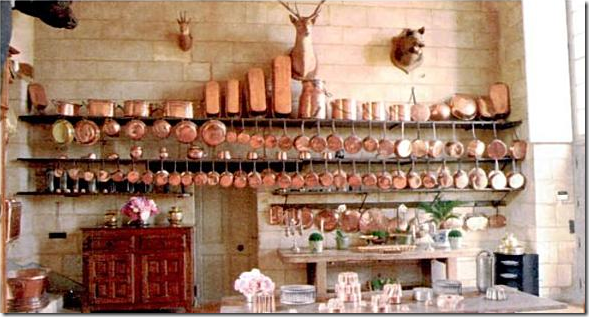 Found in a book – it’s the same view as above, just wider. This larger view shows more of the incredible copper pot collection.
Found in a book – it’s the same view as above, just wider. This larger view shows more of the incredible copper pot collection.
Art and Decoration: it appears fresh fabric recently went up in the bedrooms, courtesy of Braquenie.
This room is done in the beautiful Anet by Pierre Frey’s Braquenie.
This bedroom has a beautiful gray painted French bed. Notice the adorable fringe trimmed end table. Again, the French style, one fabric covers everything in the bedroom.
Its fabric shows 18th century flower vases and angels. Pierre Frey sells this fabric called Aix de Provence.
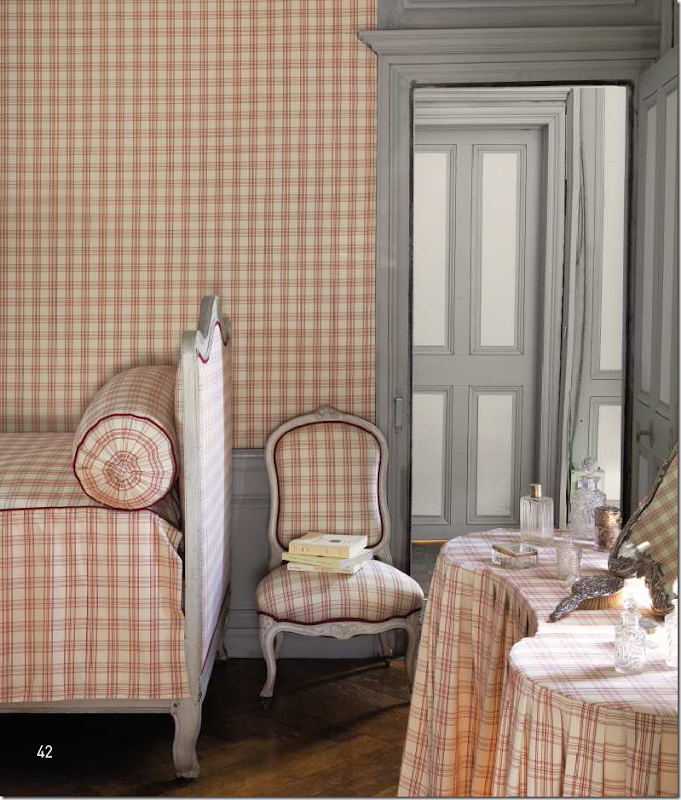 A third bedroom is in crisp plaid – one fabric covers everything in the room, including the walls. Notice the small vanity chair – so feminine!!!
A third bedroom is in crisp plaid – one fabric covers everything in the room, including the walls. Notice the small vanity chair – so feminine!!!
Beauvoir – from Pierre Frey’s Braquenie.

An old photograph from a book shows another room with French chairs covered in tapestry fabric. The desk is an incredible antique. Notice in this room the floor is not in the Versailles pattern, nor do the walls have full molding. Those details must have been saved for the Grand Salon only.
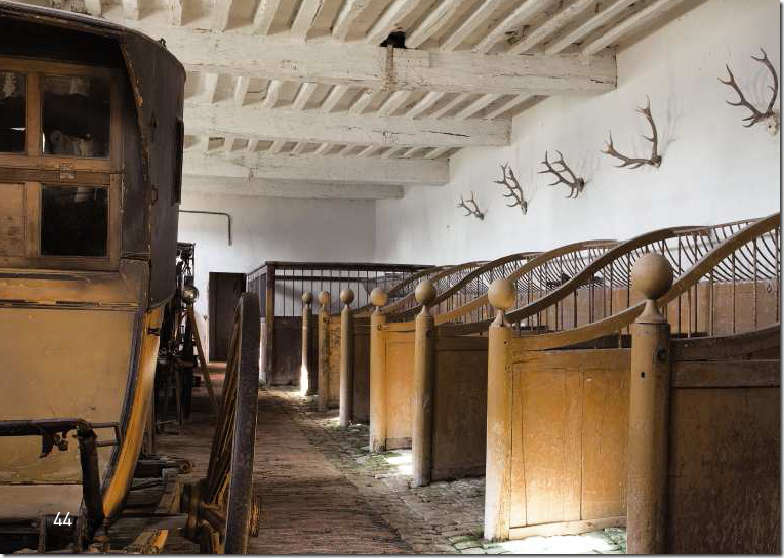 Art and Decoration: the empty stables and horse drawn carriages, left over from another generation.
Art and Decoration: the empty stables and horse drawn carriages, left over from another generation.
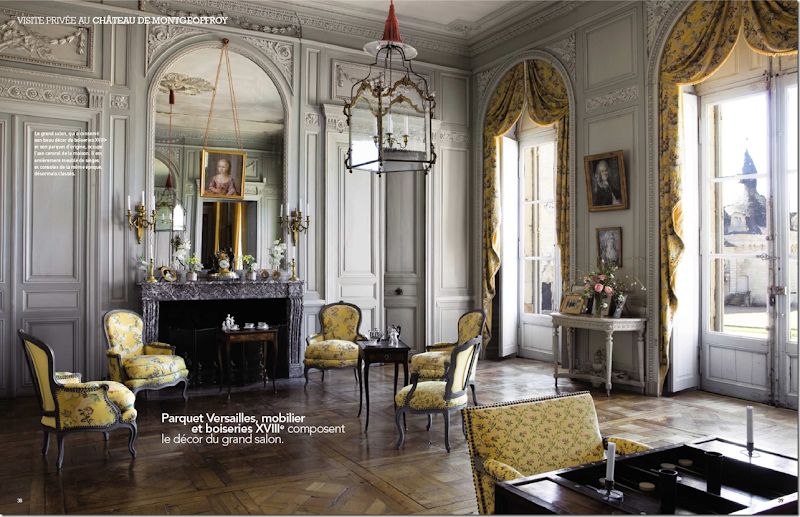
Finally, looking again at the Grand Salon in Montgeoffroy – it reminded me of another beautiful French chateau:
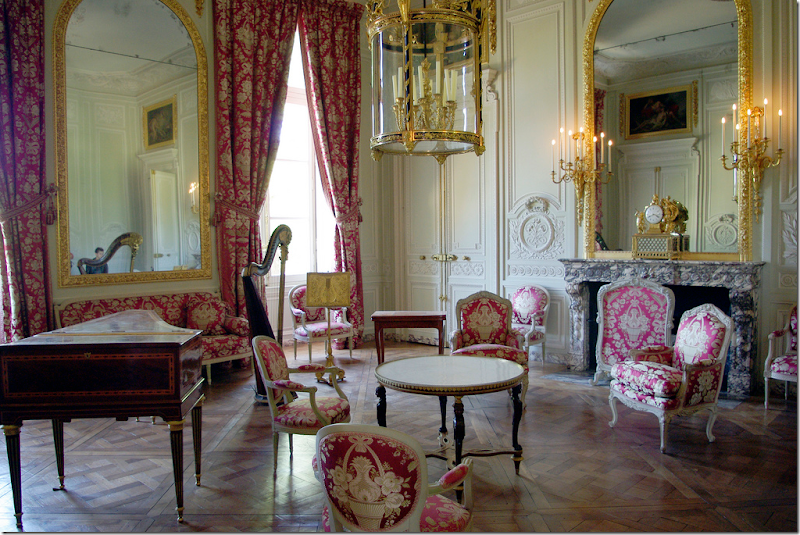 Marie Antoinette’s Petit Trianon in Versailles. Though Montgeoffroy is not quite as opulent, it’s a close second. I love how all the chairs and settees are painted gray – today, this is so trendy and in vogue.
Marie Antoinette’s Petit Trianon in Versailles. Though Montgeoffroy is not quite as opulent, it’s a close second. I love how all the chairs and settees are painted gray – today, this is so trendy and in vogue.
And this carving, above the door in the dining room, reminds me of a wood fragment I bought in Austin a few years ago:
The fragment is above the cabinet in the dining room. Though not exactly the same, I can imagine that my fragment once was lived above a doorway in France somewhere……..!
Unfortunately, there is no web site for Chateau Montgeoffroy, but if you google it, there is plenty of information from travel agencies regarding dates the house is open to the public. Let me know if you go, or have gone!!!!
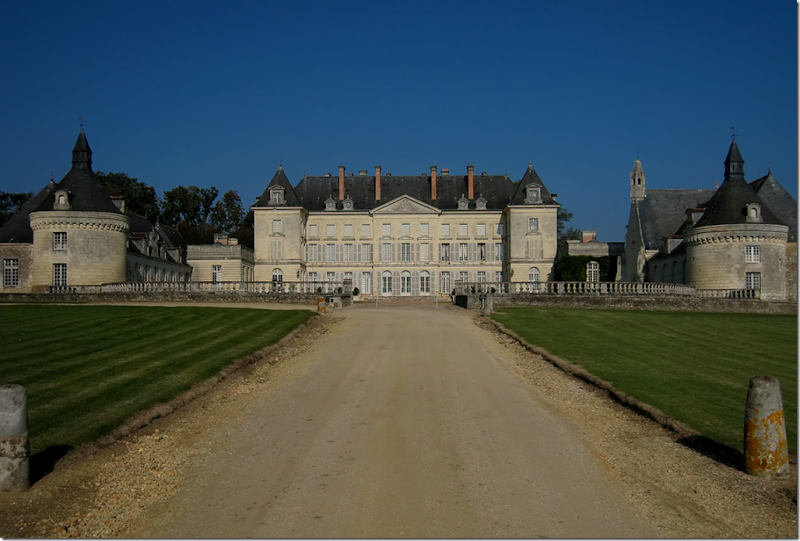

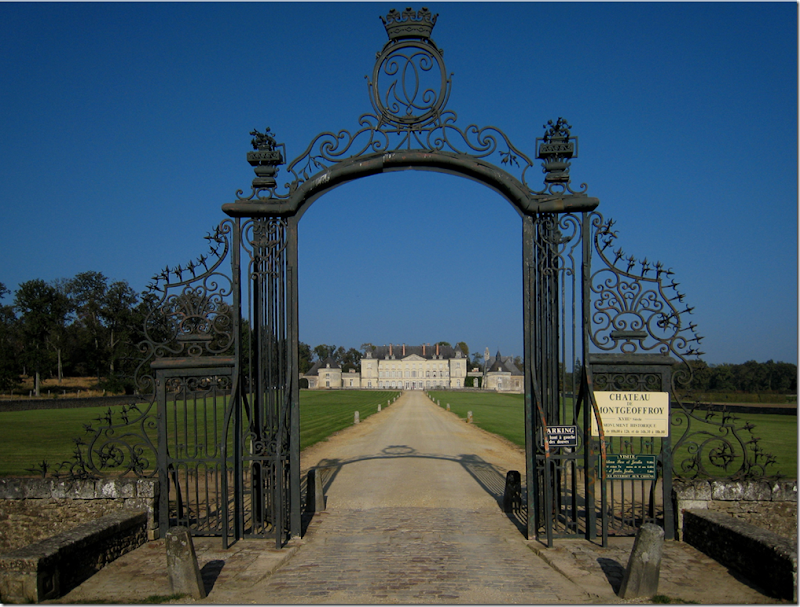






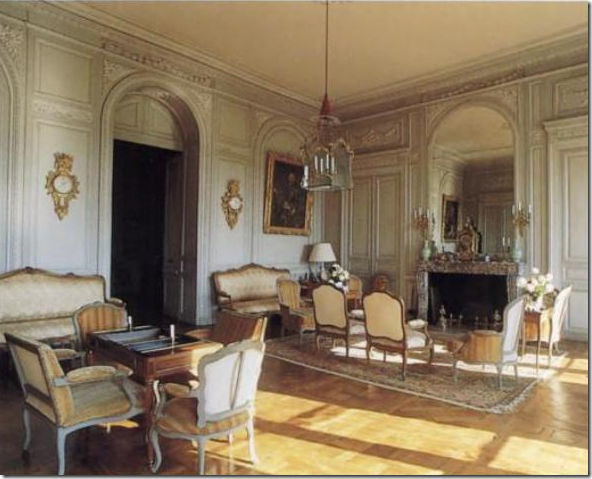
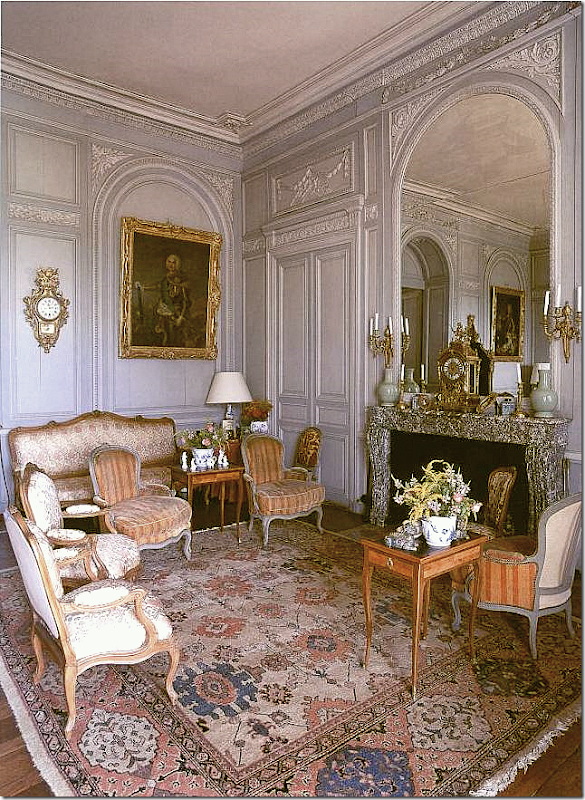
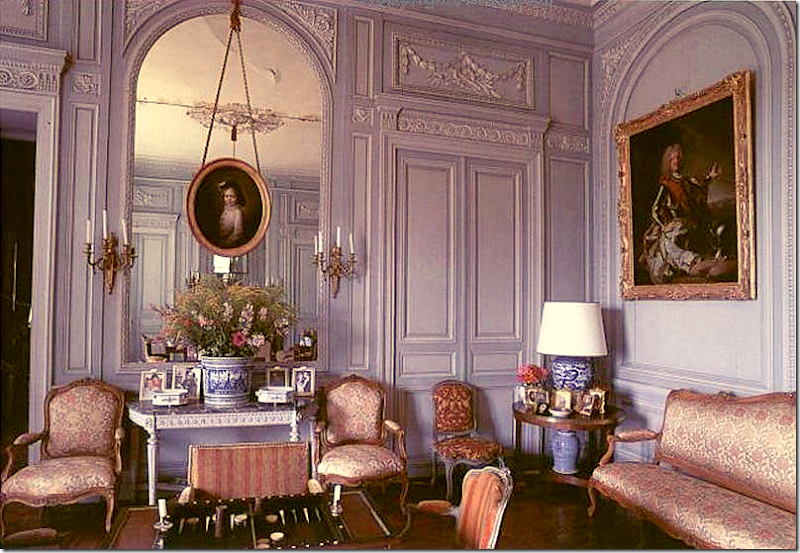


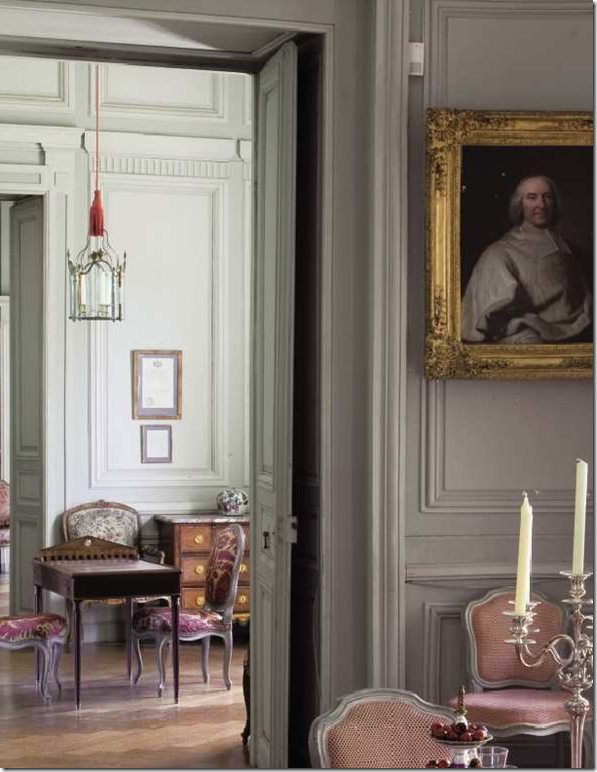


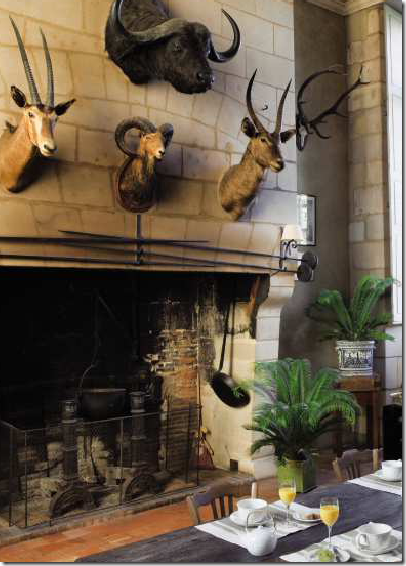
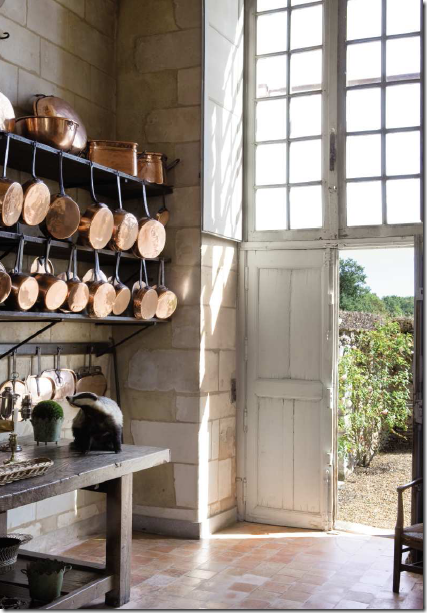

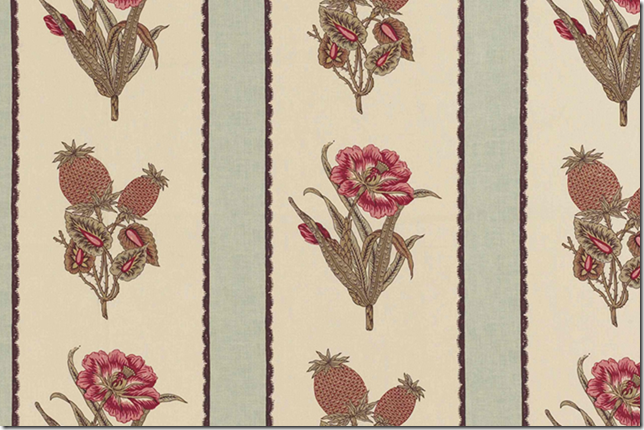
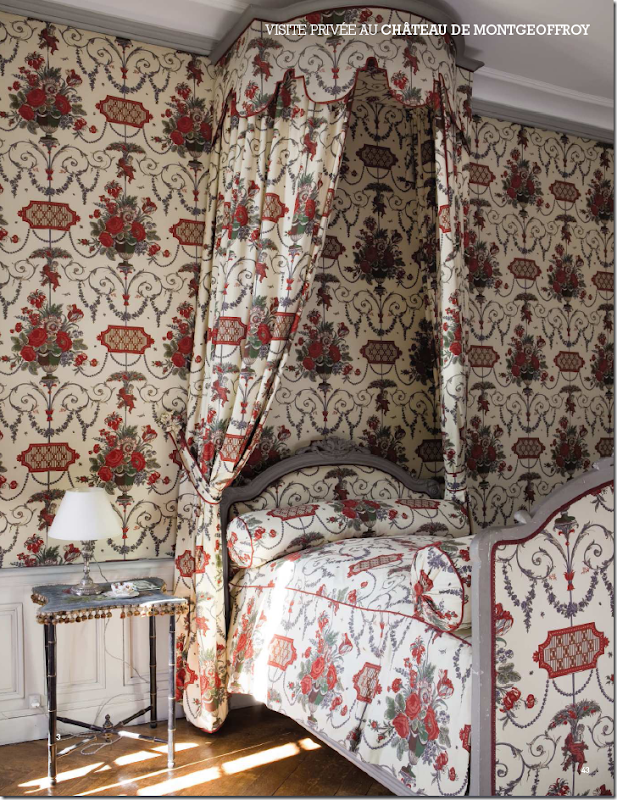


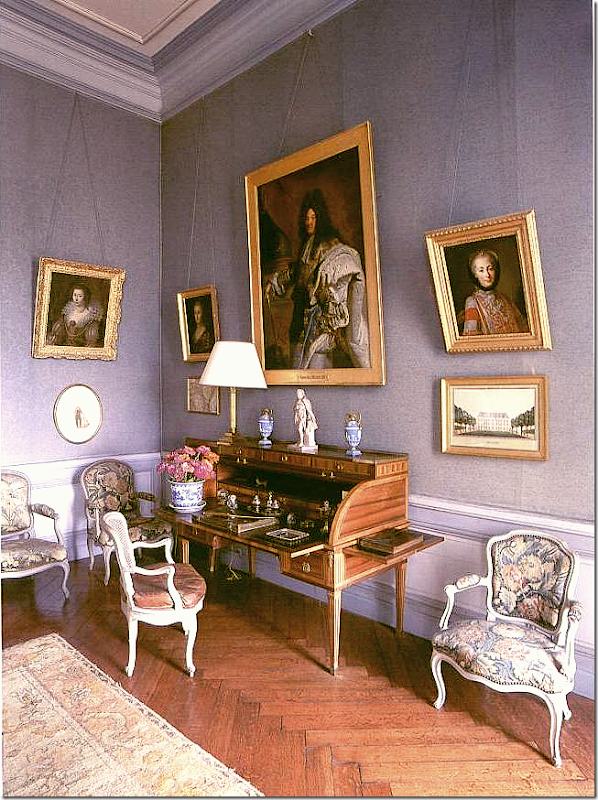
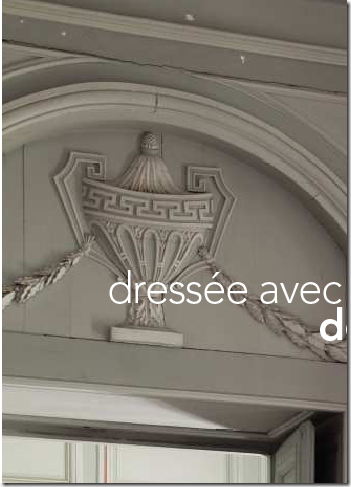
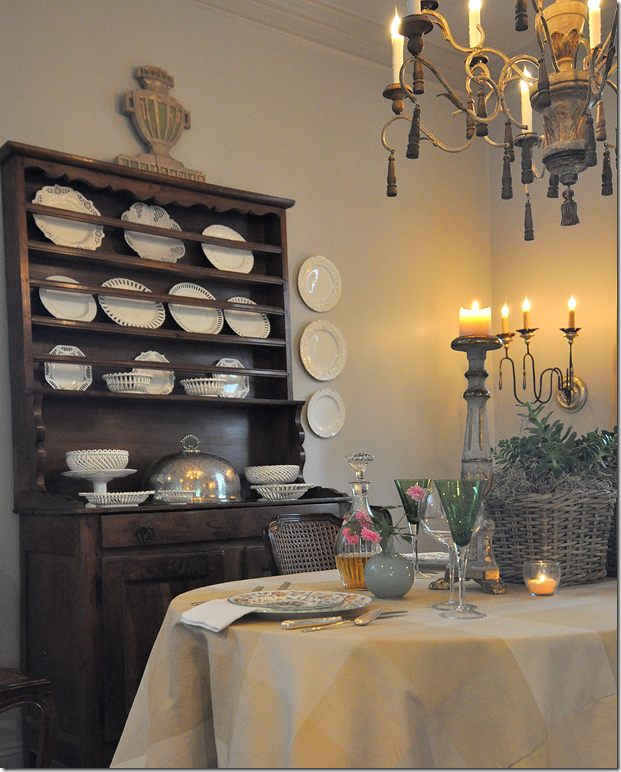
No comments:
Post a Comment